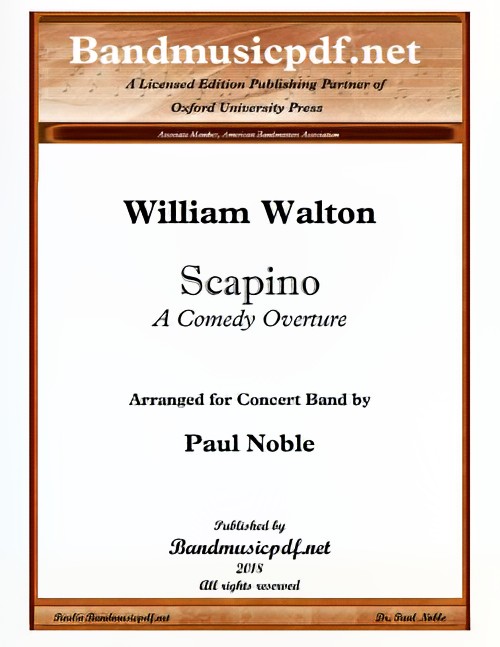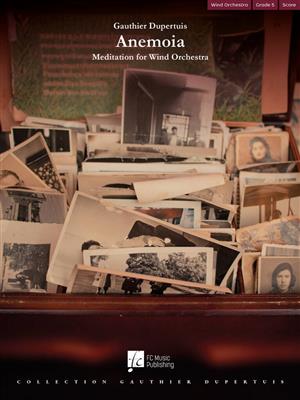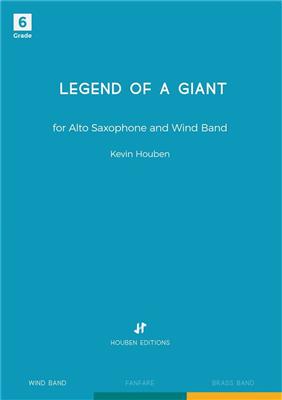Results
-
 £395.00
£395.00Scapino (A Comedy Overture) (Concert Band - Score and Parts) - Walton, William - Noble, Paul
William Walton's Scapino: A Comedy Overture took as its inspiration the three-act comedy of intrigue Scapin the Schemer (French: Les Fourberies de Scapin) by the French playwright Moli?re. The title character Scapin is similar to the archetypical Scapino character. His name is related to the Italian word "scappare" (to escape) and his name translates to "little escape artist" in reference to his tendency to flee from fights, even those he himself begins. The play was first staged on 24 May 1671 in the theatre of the Palais-Royal in Paris. Scapino tends to make a confusion of anything he undertakes and metaphorically "flees" from one thought, activity or love interest to another, as his name implies, although he usually will return to it - eventually. Self-preservation and self-interest are his main concerns. This is not to say his wits are without merit. He is a schemer and scoundrel, and takes a certain pride in these facts. He was originally a masked character, although later versions usually have the actor simply powder his face. He is traditionally shown with a hooked nose and a pointed beard. Scapino was composed on commission from Frederick Stock and the Chicago Symphony on the occasion of the group's 50th anniversary, and received its world premiere by that ensemble, conducted by Stock, in 1941. This faithful arrangement is sure to find its way into the serious repertoire of outstanding Concert/Wind Bands worldwide.
Estimated dispatch 7-14 working days
-
 £264.99
£264.99Panoptikum (Concert Band - Score and Parts)
Armin Schaer commissioned this work in his search for a new piece for the tuba. More specifically, he wanted a work that showed off the versatility of this splendid instrument, written in a musical style that is both fresh and modern, while not banishing the orchestra to a simple supporting role. Taking all these specifications into account, Thomas Doss created a work that allows stylistic leaps and is fun, exciting, romantic, and virtuosic, but does not lose sight of the thread that connects the opening measures to the very last.Armin Schaer describes his Panoptikum as follows:Panoptikum is a show of appreciation for my beautiful home and community at Lake Constance, an eventful life, the people that have enriched this life, and a fascinating instrument: the tuba. This work musically embodies the many different moods found around theBodensee - cheerfulness and melancholy, departures and longing, calm and agitation. The roles of the soloist and the orchestra were consciously crafted in a way that does not follow the usual conventions of the genre. The work should spark emotions, address broad segments of listeners, and persuade them of the tuba's ability to be a solo instrument as well as the richness symphonic wind ensembles have to offer. I hope this work enriches the lives of all the soloists and orchestras that cross its path, as well as everyone in the audience who gets to partake! 15:30
Estimated dispatch 7-14 working days
-
 £189.99
£189.99Masked - Alex Shapiro
Masked by Alex Shapiro is composed in the exact shape of a Classical Minuet and Trio waltz, though the music--a whimsical if somewhat demented masked ball (or, balls, in this case)--bears little connection to that of Mozart or Haydn. Historically, third movement Minuets gave way to the joke-like Scherzo, and the Trio section tips its hat to some welcome levity. This is one of four movements in Suspended, a piece is composed in the tradition of an 18th century Classical symphony: four contrasting movements which serve specific functions and reveal a story. The work begins in absolute rage and chaos, then alternates between moments of grief and bleakness. Grim reality shifts to a macabre, circus-like insanity, and by the end, flickers of genuine hope contrast a pervasive sense of dread, and finally arrive at more optimistic possibilities. To perform the piece, you'll need an audio system capable of playing the prerecorded audio tracks from a laptop computer via a small digital audio interface connected to an audio mixer. Download information is provided in the printed piece.
Estimated dispatch 7-14 working days
-
 £244.00
£244.00Anemoia - Gauthier Dupertuis
Gauthier Dupertuis wrote Anemoia as part of his master's thesis at the Lausanne University of Music. It is dedicated to the most significant figure in his musical life: his teacher Jean-Claude Kolly.Anemoia is the name given to the feeling of nostalgia that one feels for a time that has never known. This emotion often translates into the uneasy sensation of having lost something important or of not living at the right place or time. Fascinated by this concept, Gauthier Dupertuis tried to translate it into music oscillating between exaltation, anguish and nostalgia.The piece is formed by two movements: (Un)desired sorrow and Behind the glass of time. The first movement initially evokes the feeling of unease one feels when suddenly struck by anemoia. It then evolves into majestic atmospheres, marking our admiration for times gone by. The second movement treats anemoia in a more melancholic way.The premiere took place on 6th December 2024, during Jean-Claude Kolly's last concert as a conductor of the Concordia de Fribourg, marking thirty years spent conducting this wind orchestra.
Estimated dispatch 7-14 working days
-
 £60.50
£60.50Roman Triumph - Matthew R. Putnam
Regal, triumphant, and magnificent! This new work for young band is unique in all the best ways! Sitting at a tempo and style that is not as common for this grade level, Matthew R. Putnam has given us a throwback to the Appian Way! So much to teach and so much fun, this one is a knock-out!
Estimated dispatch 7-14 working days
-
 £149.00
£149.00Legend of a Giant - Kevin Houben
Legend of a Giant is a composition for solo alto saxophone and Wind Band composed by the Belgian composer Kevin Houben. The composer dedicated this challenging saxophone concerto to the Spanish saxophone virtuoso Mariano Garcia.The work had its premire in May 2021 in the Lemmensinstitute with the Wind Band of the LUCA School of Arts in Leuven (Belgium) conducted by Ivan Meylemans.Mariano Garcia is a full time professor saxophone at the LUCA School ofArts, the Conservatorio Superior de Musica de Aragon in Zaragoza (Spain) and the Wiener Akademie Musik (Austria).As in any classical concerto the saxophone soloist 'competes' with the orchestra: first alternately, in dialogue witheachother, afterwards fraternally together. Moreover the orchestra is regarded as an equal partner, therefore also for the musicians of the orchestra this cinematic score presents a tough challenge.Legend of a giant immerses thelistener in the world of the saxophone and challenges the soloist in the field of lyricism and timbre, but also on a technical level. In this way various aspects and modern playing styles such as bisbigliandos, double staccato,frullatos, glissandos, harmonics of overtones,... pass in review. In a word: a tough 'challenge' for any saxophone virtuoso! (!) A simplified version of the saxophone solo part also exists.
Estimated dispatch 7-14 working days
-
£72.95
Ruminations - Sean O'Loughlin
Lush, "reflective," and "pensive" best describe this emotional piece by composer Sean O'Loughlin. Ruminations is chock-full of opportunities for the young band to play expressively and to learn to stretch and pull a phrase. Playing slow, lyrical music is the best way to improve these skills and this year, this is the piece with which to do it.
Estimated dispatch 7-14 working days
-
 £71.50
£71.50Buckeye Rondo - Larry Clark
Buckeye Rondo was commissioned by the Ohio State University for their annual middle school honor band festival. Composer Larry Clark used this opportunity to write a piece in a rondo form, but with some modern twists. The main theme is very catchy, and is used in various harmonic treatments and style. The episodes of the rondo as is common, increase in length and diversity as the piece develops. What a great way to introduce this form to young bands, and on top of that, the piece is infectious and expertly scored to make your band sound their best.
Estimated dispatch 7-14 working days
-
 £57.50
£57.50Old Churches - Michael Colgrass
Gregorian chant is one of the earliest forms of notated music, using free flowing rhythms and simple melody. In Old Churches, composer Michael Colgrass uses these elements to create an aura of voices echoing in the monastery. Using easy graphic notation, students have a fun and creative way to explore sound production along with the compositional process. (Includes score and parts.) Learn more at YouTube. BandQuest, an exciting series of new music and accompanying curricula for band, is a program published by the American Composers Forum. The series was started as a response to feedback from music educators that there is a pressing need for new, fresh band music. The heart of this program is new works written by a diverse group of leading American composers who have created challenging pieces that are a true departure from standard middle school repertoire. Every BandQuest project includes a residency component in which the composer works collaboratively with a middle school as they create their new piece. Many BandQuest pieces are accompanied by an interdisciplinary curriculum designed to assist students as they learn the music and to integrate each piece with non-music studies. Visit www.bandquest.org to learn more about this innovative series, and email [email protected] to request a free downloadable audio catalog.
Estimated dispatch 7-14 working days
-
 £89.99
£89.99Mercury - Jan Van der Roost
Mercury is a concert march composed in a typically British idiom. In 1990, Jan Van der Roost wrote this piece on the occasion of the 15-year anniversary of his own band: Brass Band Midden Brabant. Like many British marches, the main theme is written in a minor key. Powerful and virtuoso themes characterize the first part of this march, while the trio melody is much more melodical, offering the tenor register to display its lyrical skills. Follows a dynamic passage for trombones and trumpets/cornets, leading to a "grandioso" version of the main trio melody and thus concluding this march in a magnificent way.
Estimated dispatch 7-14 working days
